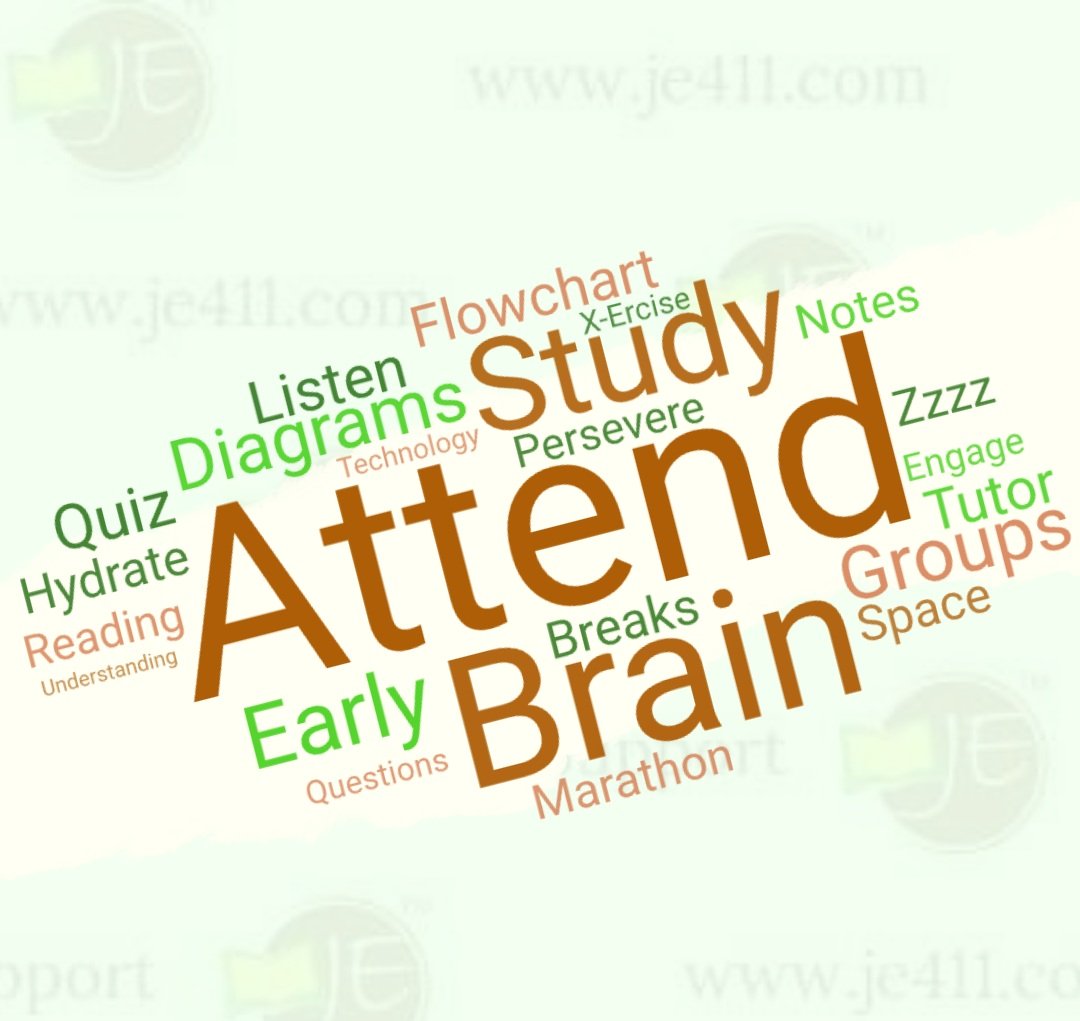ABCs of Healthy Study Habits
“Study” - a word that most students hate to hear. As much as studying seems like a chore, it’s a vital part of the educational process. With the right skills in place, students can turn study times into exercises that will benefit them throughout their academic journey.
It’s as simple as A, B, C… Click here to download the free student handout on the ABCs of healthy study habits.
Attend Every Class
How can students gather the necessary information when they don’t attend class? Firsthand information from the teacher is best. So, we want to encourage students to attend classes daily to avoid losing academic gains and missing out on important information.
Brain Food
According to The Centers For Disease Control And Prevention, children who eat healthier foods have better cognitive function. This means students are better equipped to pay attention. Healthy eating habits also help students recall vital information learned during class and reviewed during study periods.
Create Your Own Study Tools
Sometimes, to ensure that the material a student is learning sticks with them, a unique approach to information retention is necessary. Helping students create songs about content and make associations between their experiences and content are two possibilities. Building relationships with students aids in this creative process.
Diagrams
Visual aids like diagrams are a great way to help students who get lost in the details. Diagrams may be snapshots of either step-by-step sequences or clusters of related information. Plus, they are particularly helpful to visual learners and big-picture learners.
Early Start
The early bird catches the worm! The earlier students start honing their study habits, the earlier they commit to the learning process, the more successful they will be. Getting a head start on studying makes room for more practice and preparation. Starting early and remaining consistent creates opportunity for questions and discussions before high-stakes tests.
Flowchart
A flowchart is a diagram that breaks down an item or task into actionable steps or functions. Flowcharts are an excellent method when studying stepwise processes like the scientific method or the flow of events literature.
Groups
Studying in groups allows students to better understand materials by gaining different perspectives and insights from peers. Study groups are also an excellent way for students to remain accountable for their work and combat procrastination.
Hydrate
Encourage learners to drink plenty of water during learning activities. Hydrated students are exceptional students. According to the CDC, drinking plenty of water helps improve memory, assists with attention span, and can even ward off illnesses that inhibit learning.
Increase Reading Proficiency
Reading is an integral part of all learning. Reading regularly improves reading comprehension skills and endurance. Through guidance and practice, readers become equipped to digest increasing amounts of information with ease. We want to be intentional about the transition from learning to read to reading to learn across content areas.
Just Do It
It’s easy to put off the challenging or boring tasks until another day or time, but students who procrastinate seldom get around to the act of execution. We want to incentivize them to go ahead and handle business!
Know Your Blind Spots
If students have a particularly weak area, we want to be intentional about strength training in the weak area. Too often, it’s easier to focus on the strengths. Taking a strengths-based approach to education means avoiding allowing student strengths to fade into the background; still, teaching to students’ blind spots equips them with the strategies to persevere.
Listen Twice
Whenever possible, record classes and study sessions. Listening to or watching lessons a second time reinforces concepts and cements learning. This practice helps students address gaps in learning.
Marathon, Not Sprint
By cramming, we know they’re primarily memorizing for the sake of a test, only to lose the information later. We want to remind students that the goal of studying is bigger than each test; the goal of studying is to learn material for the purpose of application to solve real-life problems.
Notice Others’ Questions For Understanding
Explicitly challenge students to pay attention to questions that their peers ask in class and during group study. One student may pose a question another student hadn’t considered. When students are intentional about learning from peers, this kind of opportunity may lend needed perspective or deeper understanding.
Old Exams
Looking over old tests is a great way to study and recover from mistakes. Model for students how to pay attention to both the concepts they master and those they struggle with, and use this information to create a game plan for approaching studies more productively.
Persevere
Studying is not for the faint of the heart! Studying requires growth, which can get tough sometimes. As the struggle rears its head, let’s serve as our students’ biggest cheerleaders. Encourage them to persevere. Remind them that their grades will thank them for it later!
Quiz Yourself
After studying, take time to quiz students on what they’ve been studying. Teach them strategies to quiz themselves. Equip them with tools to quiz themselves. We want to make progress visible. It’s challenging to address the challenges we don’t track. The process of quizzing and grading quizzes (in all their many forms) shows us what to celebrate and what to strengthen.
Regular Breaks
Taking regular breaks during study periods gives students time to relax and passively process information. Cognitive overload happens when the brain becomes overwhelmed; misbehavior and frustration manifest as a result. Regular breaks are our proverbial restart button.
Space
Study environment is also important. We want to help students find and create the best possible study environments. Having a space for everything that’s needed for a successful study session certainly boosts performance. Controlled noise levels and minimal distractions are key.
Study Spot is a Jackson Education Support community engagement initiative for secondary students to access homework help, receive project support, learn accountability, and much more. Click here to learn more and register today.
Tutor
When students consistently struggle in a particular area, it may become necessary to find a tutor who can help. You can find a tutor through the school, local library, or search online. Click here for tutor search help.
Use Technology Wisely
Technology is fantastic tools with many different uses, including studying. Students can watch instructional videos and tutorials, create quizzes for themselves, and connect with tutors and students for academic support. Technology is an invaluable learning tool.
Voice Questions For Understanding In Class
We can ensure students aren’t afraid to ask questions in class by inviting students to do so and modeling this process. Creating a classroom culture wherein questioning the content is a requirement fosters the exchange of ideas that shows up in study groups. Questions lead to answers and more questions, which is where the real learning happens.
Write Notes To Actively Engage
Students should master the art of notetaking in class. Whenever possible, note taking by hand engages different areas of the brain and can lead to more meaningful learning experiences. Relationships with students are opportunities to figure out what works: bullet points, colors, images.
X-ercise
Get up and move! Regular exercise improves memory, mood, and cognitive function. Exercising is a healthy way for student’s to get clear between classes or study sessions.
Your Why
First, probe student motivation for academic success. Why are they there? Why do they care? Then, use your observations and their answers to these questions to remind them of their why after the honeymoon phase ends and the rubber meets the road.
Zzzz’s
We want to help students understand the value of getting plenty of sleep. The CDC suggests that teenagers 13–18 years old sleep 8–10 hours daily. When students are rested, research tells us they feel better, perform better at school, and retain information better.
Is your child in need of a safe space to complete classwork and get assistance with exam prep? Register for Study Spot today.
Academic accountability is an important skill. Students who are held accountable for academic outcomes may learn to hold themselves accountable. But, students who are taught strategies for holding themselves accountable are better equipped to enjoy the fruits of accountability: confidence, motivation, healthy habits, and success.
Mastering the ABCs of healthy study habits is certainly a step in the right direction. Click here to download the free handout for secondary and adult students.



